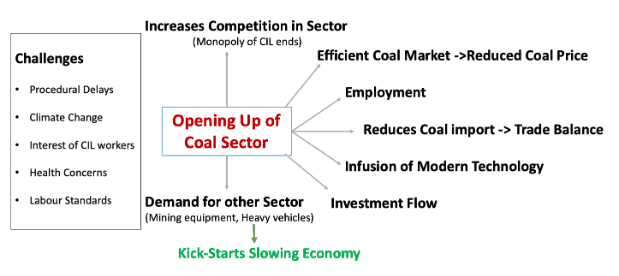UPSC Articles
Indian Economy
TOPIC:General Studies 3:
- Indian Economy and issues relating to planning, mobilization, of resources, growth, development and employment.
- Infrastructure: Energy
- Investment Models
Coal Sector in India: Norms liberalised for entry and regulations relaxed
Context:
The Cabinet approved the promulgation of Mineral Laws (Amendment) Ordinance 2020.

Daily Current Affairs IAS | UPSC Prelims and Mains Exam – 10th January 2020
What provisions does Ordinance contain?
- It allows Coal mining by any Companies
- Earlier: Only those in Power, Iron & Steel and Coal washery Business could bid for Mines
- It also does away with captive end-use criteria i.e. Coal can be commercially mined and sold to any buyer in an open market
- Earlier: The Coal mined by a licensee could be used for only specified purpose like for its own Thermal power plant i.e. they could not be sold in Open market like that of Coal India Ltd (Public Sector Enterprise)
What are the advantages accruing from this changed regulatory regime?
- Expands the pool of Potential bidders: This will lead to better competition during auctions thus fetching better revenues for the government.
- Development of Coal market: End use restriction inhibited the growth and development of the market thus driving down the Coal production and also distorting free price discovery of the mined coal.
- Reduces Coal imports: India imported 235 million tonnes worth 1.71 Lakh Crore Rupees. Of these 135 million tonnes could have been substituted by domestic Coal production. Reduction in Coal imports leads to saving on foreign exchange reserves and also betters our trade balance.
- Brings an end to Monopoly of Coal India Ltd.: Movement from State controlled system to free-market economy which incentivizes the private sector to act as engines of growth.
- Efficient use of resources: Enhanced competition will inevitably lead to better utilization of the natural resources available in the country.
- Employment: Large investments in mining will create jobs in the country.
- Demand creation for other Sectors: Opening up of the sector will set off demand in critical sectors such as mining equipment and Heavy commercial vehicle industries.
- Infusion of Modern technologies into Coal Sector: The move will also help India gain access to sophisticated technology for underground mining used by global miners
- Helps achieve government target of 1.5 billion tonnes of domestic coal production by 2023-24.
What are the possible challenges/demerits of this step?
- Procedural Delays: Government should ensure that approval and compliance procedures are not archaic & draconian which will increase the upfront cost thus deterring private players to enter the sector.
- Climatic Concerns: When countries across the world are moving away from fossil fuel resources this step to enhance Coal production is criticized by environmentalists
- Health Concerns: Coal burning releases Carbon dioxide, particulate matter, sulphur dioxide, nitrogen oxide and mercury- thus damaging the health of many people around the region.
- Interest of Coal India Ltd: This is a Maharatna PSU which is considered as a National asset and is listed in the stock exchanges. Opening up of the sector should not compromise the capability of CIL and avoid the way BSNL went down in telecom market.
- Employers of CIL: Nearly 3 Lakh people are employed in CIL. Opening of the sector should not endanger the growth prospects of CIL and the livelihood aspects of the employers.
- Labour Standards: Private companies in order to reduce their input costs and maximise their profits may subvert labour guidelines which may have detrimental effect on workers engaged in those enterprises.
Way Ahead
- The move comes at a time when the window for fossil fuels is rapidly closing, and the global energy landscape evolving, with fundamental changes to the investment culture amid growing climate concerns.
- Government thus needs to balance its commitments towards Climate Change and its imperative to push the developmental agenda. Promotion of Clean Coal Technology which is at present Cost prohibitive is the way to move ahead
Connecting the dots
- Impact of opening up of Coal sector on India’s pledges made during Paris Climate Deal, especially in the backdrop of US withdrawing from the deal
- Should Railway sector also be opened up for private players
- Lessons learnt from Liberalisation of Telecom sector in the wake of declining fortunes of BSNL
- Should Air India be privatized in the light of mounting losses











